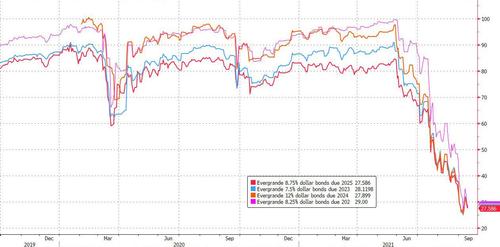China’s “Lehman Moment” Arrives On 13th Anniversary Of Lehman Bankruptcy: Beijing Tells Banks Evergrande Won’t Pay Interest
Yesterday, when covering the non-stop drama surrounding China’s most insolvent property developer, Evergrande, we said that it would be remarkably ironic if Evergrande were to announce a default – which everyone knows is coming – today, on the 13th anniversary of Lehman’s bankruptcy filing on Sept 15, 2008.
Evergrande should fold on Lehman day (tomorrow)
— zerohedge (@zerohedge) September 14, 2021
Well, in this delightfully absurd world we live in, that’s just what happened only instead of Evergrande making the announcement, it was the entity that will soon control the massively overlevered property developer that made it for them: the Chinese government.
According to Bloomberg, Chinese authorities told major lenders to China Evergrande Group not to expect interest payments due next week on bank loans, which takes the cash-strapped developer a step closer the nation’s largest modern-day restructurings, and guarantees that China’s “Lehman Moment” is now just a matter of days, if not hours.
According to Bloomberg, citing unnamed sources, the Ministry of Housing and Urban-Rural Development told banks in a meeting this week that Evergrande won’t be able to pay its debt obligations due on Sept. 20, and instead most of Evergrande’s working capital in now being used to resume construction on existing projects, the housing ministry told bankers, according to a Bloomberg source.
And since nonpayment of interest and principal will represent an event of default, the company is unlikely to make any subsequent interest, or principal, payments either since it will have already default even though Bloomberg claims that “Evergrande is still discussing the possibility of getting extensions and rolling over some loans.” It won’t, especially since the developer will also miss a principal payment on at least one loan next week, which means it’s game over.
Meanwhile, as reported previously, Chinese authorities are already laying the groundwork for a debt restructuring of the $300 billion company (which recently hired Houlhan Lokey to advise it during the upcoming historic bankruptcy), assembling accounting and legal experts to examine the finances of the group. With senior leaders in Beijing silent on whether they will allow Evergrande creditors to suffer major losses, bondholders have priced in slim odds of a rescue infuriating countless investors and creditors who have mobbed the company’s offices across the country and also gathered at its HQ, demanding the company “return their money.” It won’t happen.
It’s unclear whether Evergrande, founded by billionaire Hui Ka Yan, intends to pay about $84 million of dollar-bond interest due Sept. 23. We doubt it: according to Bloomberg, Guangdong officials have turned down at least one bailout request from Hui, who owns a controlling stake in the developer.
The company’s complex web of obligations to banks, bondholders, suppliers and homeowners has become one of the biggest sources of financial risk in the world’s second-largest economy.
China banks and property firms tumbled after Bloomberg reported the delayed payments, while Evergrande dollar bonds and shares hit session lows Wednesday afternoon, after Bloomberg’s report, as bond investors are bracing for missed payments and as Moody’s and Fitch both downgraded Evergrande this month, citing an increasing likelihood of default. The Firm’s 8.75% note due 2025 fell 1.6 cents on the dollar to 25.8 cents as of 2:27pm in Hong Kong, according to Bloomberg-compiled prices. The 8.25% dollar bond due 2022 dropped 1.4 cents to 25.3 cents, on pace for record closing low. Shares fell as much as 6.1% to their lowest since January 2014.
As noted on Monday, Evergrande’s failure to meet its obligations on time has led to protests across China by homebuyers, retail investors and even the developer’s own staff, raising the prospect of social unrest if the property giant’s troubles spin out of control. The company said on Tuesday if it’s unable to repay debts on time or get creditors to agree to extensions or alternative arrangements, it may lead to cross-default.
Whether the selloff drags down the broader credit market may depend on the company’s ability to buy time with banks, as well as the overall state of the Chinese economy. A messy default on loans could stoke fears of widespread contagion, something Xi Jinping’s government has been keen to avoid even as it tightens financing restrictions on overstretched developers and discourages government bailouts.
Commenting on the upcoming fireworks, Keith Temperton, sales trader at Forte Securities said “The Asian banks will get hit hard if there’s a default, but then there will be a 10-year recovery process. The market’s getting a hang of it. The way they’ve managed the news flow seems quite clever. They haven’t let a swathe of bad news at once.”
That’s true, but as Mark Twain said, when explaining “How do you go bankrupt? Two ways. Gradually, then suddenly.” Until now we were in the “gradually” phase. Today, we just got to the “suddenly” part.
Tyler Durden
Wed, 09/15/2021 – 09:17
via ZeroHedge News https://ift.tt/3tJUXYb Tyler Durden
